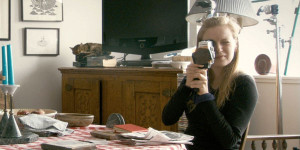Documentaries are often underrated by mainstream audiences. They may seem “boring” depending on the topic but they can be incredibly strong, revealing events on the screen that the audience would otherwise never have seen. Or they tell a very personal story like Sarah Polley’s examination of her family secrets, Stories We Tell.
It is eased in with a quote about storytelling by Margaret Atwood, and footage of the nervous interviewees setting up. The director’s father will be narrating the long family history, from beginning to end. Interspersed are images of a woman, clearly decades old and you know that this person will play a big role in this film.
It’s Diane, the mother. She is the pillar of the Polley family, omnipresent and spreading her liveliness and love. The people she left behind remember everything about her. Her laugh, that she loved to party and sing, even though she couldn’t sing. She had a larger than life personality, infecting everyone with her love for life and fun.
But she had secrets as well. As an actress, she travelled for her work and as a wife, she was not always that happy. She needed excitement and change going out dancing and seeing friends, while Michael was happy being at home with the family.
As a result, Diane had an affair when she was doing a play in Montreal. A few months later, she was pregnant with the baby who would eventually make this documentary.
It became a running joke in the family that Sarah may not be Michael’s biological daughter. The two of them were very close after her mother’s death and her older siblings had left the house, and the insinuations never affected their relationships. However the other family members would still joke around, point out that Sarah looks nothing like her father and joke “Who’s your father this week?”.
Many years later, Sarah would start investigating herself and meet with the people who used to know her mother during those years. With many pieces of the puzzle emerging, Sarah finally got to know her biological father, Harry Gulkin.
The film is extremely intimate, looking at the family relations and secrets very closely. It scrutinises everyone involved and makes them admit things they never shared with anyone.
For Sarah especially, it was also a difficult project. She finds out that her mother had already made an appointment to have an abortion. “It’s amazing how close we were to you never existing,” says her father Michael.
The film is about telling tales and bringing somebody to life through people’s stories about them. It’s about memory and the different ways in which we each remember people who are no longer there. For Harry, it’s his story because he loved Diane so much. For Michael, it’s his because she was his wife. For Sarah, it’s hers because she is the one whose very identity changed so drastically.
The film is beautifully made, with Rebecca Jenkins portraying the vibrant and fascinating Diane in footage that is made to look as if it was proper old family films. It is a gripping documentary that takes you into the Polley family to unearth myths and demystify the family secrets.





